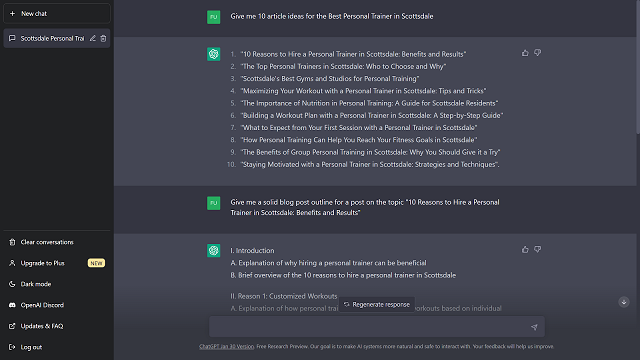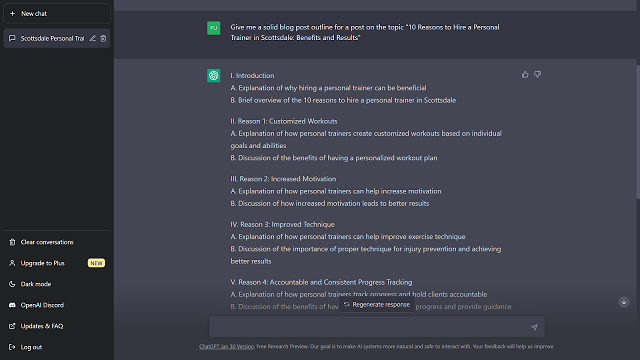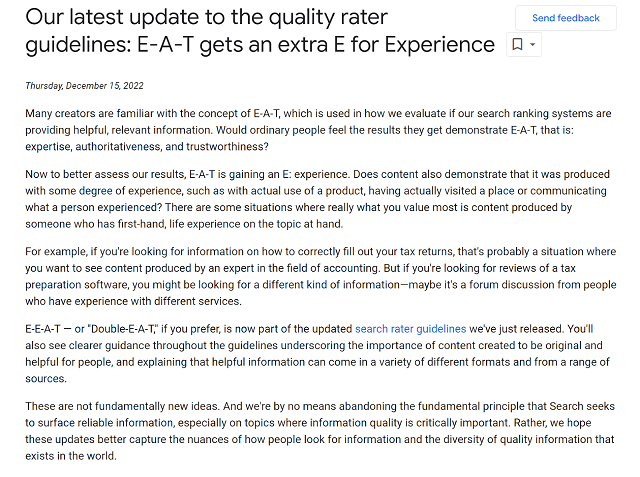With the news frenzy as of late, you’ve likely heard a lot of competing information about ChatGPT or one of its competitors and how AI writing tools are revolutionizing the wild world of blogging. But, is it something you should use for your blog? In this post, we’ll explore how to write a blog post using AI - the right way.
And, before you come at me, I should state I’m a writer that makes a living from creating content every week. I’m not on #TeamAI, but I’m also not exactly on #TeamNoAI either. Hopefully, by the end of this post you’ll understand why I’m writing about blogging with AI at all, and have some ideas of how to use it ethically and correctly for your own content.
Your business needs a website.
Disclaimer: When using AI tools, avoid entering sensitive information and always review output for accuracy. Additionally, this content is for demonstration purposes only; it does not represent any affiliation, endorsement, or sponsorship with ChatGPT or Open AI. All trademark rights belong to their respective owners. Third-party trademarks are used here for demonstrative and educational purposes only; use does not represent affiliation.
What exactly is AI? And what is AI writing software?
TechTarget refers to AI or artificial intelligence as “the simulation of human intelligence processes by machines, especially computer systems.” By extension, AI writing software is supposed to simulate content written by human writers.
With the use of algorithms, suggestions, and a lot of complicated computerized 1s and 0s, AI writing software should theoretically be able to take a prompt a user gives it, and deliver text content back to the user. The reason it’s causing such a stir in the writing world is that it can generate large bits of text in mere seconds.
What was taking content writers hours to complete can be created without breaking a sweat. Of course, that’s not to say what is generated is accurate, and not even necessarily great content. However, as I’ve played with several different AI writing tools at this point, I have to admit it is certainly impressive what the different software can spit out.
Related: AI prompts for small business owners
What can AI accomplish?
I think that what AI can accomplish depends largely on your goals. The different functions I’ve seen AI writing tools perform include, but aren’t limited to:
- Writing first-draft intros and conclusions for blog posts
- Generating a list of blog topics to write about
- Creating different heading and title options for blog posts
- Summarizing the points of a blog or article, or even just a section of the text for a better understanding
- Generating product descriptions for ecommerce stores
- Writing entire blog posts, articles, essays, poems, and even songs
- Analyzing the tone to determine if a block of text is professional, casual, funny, or depressing
- Creating landing pages for websites
- Writing social media posts to promote content, ideas, and views
- Generating ideas for videos, podcast episodes, and other types of content
- Brainstorm content marketing ideas
- Writing ad copy
- Answer questions (albeit not necessarily factual in its response)
- Breakdown complicated ideas into easier-to-digest ones, or beef up generic content with SAT words (For example, WordHero’s “Explain It To A Child” and “Explain It Like a Professor” functions)
Of course, this is only for the actual writing portion of blogging. I’ve seen so many tutorials and articles expressing various methods of using AI tools for everything from creating complementary YouTube videos for blog posts to generating AI artwork.
Since this article is about how to write a blog post using AI, I’ll do my best to keep my focus on that. So, is it possible for a blogger or content creator to use AI writing tools to create high-quality content? Let’s first take a look at the ethical considerations.
Ethical considerations of writing blog posts with AI
Aside from the ethical considerations related to carbon emissions generated because of the computing power AI tech is causing, some people look at using AI to write blog posts as straight-up plagiarism.
I spoke with SEO and copywriting expert Ryan Brock who is the Chief Solution Officer for DemandJump. He said whether we like it or not, Chat GPT, and all these other AI writing tools are just plagiarism. Period.
In his opinion, it scrapes the internet and then repackages it in a slightly different structure and gives it back to you. He says no matter how you look at it, “It’s plagiarism and that’s just not cool.”
He went on to say by scraping other people’s content, you’re not providing any new value to anyone. That’s not how you build trust factor if you’re trying to establish yourself as a thought leader (or if you’re trying to sell something).
On the flip side of things, Ryan admitted that for answering basic questions that are evergreen and don’t need a lot of fact-checking, it would help someone come up with ideas and break down basic concepts faster. But to actually use that in a blog post he says is doing more harm than good in the long run.
He’s not alone in this sentiment.
Joyce O’Day wrote an article back in July 2022 that basically said if you’re using AI writing tools, the content isn’t yours. She said, “All published content — popular or academic — that utilizes artificial intelligence should be appropriately labeled with the name of the AI software listed as a co-author. Otherwise, authors are taking credit for content that is not their intellectual property, which is plagiarism.”
The Guardian reported, “The use of AI tools to generate writing that can be passed off as one’s own has been dubbed ‘AIgiarism’ by the American venture capitalist Paul Graham, whose wife, Jessica Livingston, is one of the backers of OpenAI.”
I’ve seen many copywriters and content creators state in online forums such as Reddit, as well as within Facebook Groups and on LinkedIn that the act of simply pulling content from AI software is not ethical. To make matters worse, in many cases, depending on the complexity of the subject, it could be generating completely false information.
While every writing solution I’ve come across has stated it’s not responsible for the accuracy of the text that is generated, I’m not sure everyone takes the time to fact-check the content that is given to them. In fact, I personally know of a few people that have turned in shoddy work that needed to be corrected because they relied more on AI software than their own common sense. Needless to say, they lost work as a result.
Some content writers are leaning heavily into AI
While using AI for writing may not be seen as completely ethical, it’s no secret that a lot of freelancers are leaning heavily into it for content creation. One such freelance writer that is getting her fair share of flack for this opinion is “Fiverr Millionaire” and author of the book “Freelance Your Way to Freedom,” Alexandra Fasulo. The self-proclaimed Freelance Fairy believes that AI is the way of the future and she has stated she is glad it’s making waves in the world.
In fact, she recently took to Instagram to discuss Fiverr’s new category for freelancers dedicated to AI where she discussed freelancers charging to edit ChatGPT-generated articles to earn more money in less time.
At the same time, she’s certain that AI will not replace freelancers altogether. For example, one of the gigs she referenced in a TikTok video was to proofread, fact-check, and add hyperlinks to AI text.
Could edited AI text be the ethical way to produce quality content, but get it done faster and for less money? Perhaps.
I guess the real question we all need to ask ourselves is, where do we draw our ethical line in the sand?
Even Google has walked back its initial statements that it would completely downgrade a website’s search rankings if it used AI. In April 2022 Search Engine Journal reported Google’s John Mueller stated that AI-generated content was considered spam. Then, in January 2023, the publication reported Google is now saying AI content is okay as long as it’s high-quality and helpful to the user. Perhaps this is because Google is working on an AI platform to compete with ChatGPT, or maybe they just don’t want to turn off all the potential advertisers that are using AI to produce content. Who knows for sure?
What about SEO considerations with using AI writing tools?
While we’re talking Google, let’s consider SEO for a moment. Can you write blog content using AI and have that written content rank in search results?
Based on all the research I’ve done for this post, and people I’ve talked to that are much smarter than I am, the basic answer is yes, but with a major caveat.
You have to add a lot more to the post generated with AI before you can ever hope to rank with it!
In other words, if you copy and paste content generated from your favorite AI writing solution into WordPress (or whatever CMS you’re using), no, you probably won’t rank well for it.
But, if you take that base piece and improve upon it - ahem, make it MUCH better - sure, you can rank with it.
Here are the steps you need to take if getting an AI-generated article to rank well is your goal:
1. Research keywords. Don’t generate the text until you have done a thorough keyword research session.
- While researching keywords, consider your ideal customer, and what they will actually be looking for that could ultimately lead them to your page.
- Consider the questions they are asking and the pain points they are looking to solve and how your product or service can solve them.
2. Come up with article ideas. Go to your favorite AI writing solution and add a simple prompt. For example, let’s assume you’re a personal trainer trying to get more clients in the Scottsdale, Arizona area. Next, we’ll assume you’re trying to rank for Best Personal Trainer in Scottsdale. So in this case, the prompt we’ll input is “Give me 10 article ideas for the Best Personal Trainer in Scottsdale.”

3. Generate an outline. Using one of the prompts, let’s generate an outline for the post. In this case, we’ll use the prompt “10 Reasons to Hire a Personal Trainer in Scottsdale: Benefits and Results” Again we’ll go to our AI writing solution and prompt it to create an outline for a blog post on that topic.

4. Write the post. You have two options at this point and this is where things get tricky.
- Option 1 - You could technically re-prompt your writing software to address each of the points in the outline and create a pretty decent article
- Option 2 - Write the post yourself addressing the outline ideas and add in real examples and testimonials that show off your expertise and authority on the subjects
5. Refine and optimize the post. Edit, and add to the post to make it even better. To do this you can:
- Add an FAQ section to include more of the keywords people are looking for (but don’t keyword stuff the post!)
- Include some images that are optimized with proper Alt Tags and descriptions (Compress the images before loading them into the post to improve page load time!)
- Break up larger paragraphs into easier-to-read shorter paragraphs
- Add more subheads for skimmers
- Include links to authoritative sites where relevant
- Include links to your own blog posts that expand on ideas presented in the post
- Create a solid meta description that tells search engines what the post is about (Don’t forget to use the keyword(s) that you’re trying to rank for in your description!)
6. Publish and promote. It might take some time for your post to start showing up in search engine result pages (SERPs), but you can start sharing it across social media, in your newsletter, and even in forums like Reddit and Quora. Just be careful not to spam!
7. Next, you need to write more posts. One solid blog post doesn’t show off your E-E-A-T! Google released an update in December 2022 that to improve the rating of your quality it’s previous E-A-T guidelines are no longer enough if you hope to win out over your competitors.
- E-A-T “stands for Expertise, Authoritativeness and Trustworthiness.”
- So what is the extra E? Experience!

DemandJump recommends writing around 16 posts centered on the same subject to rank higher than your competitors. They refer to this as a Pillar Based Marketing campaign. It’s similar to Hubspot’s “topic clusters” way of writing which involves writing long-form content about several subtopics related to one central topic.
So in this case, you could go back to step 2 and take all the blog post ideas generated from your AI writing solution and repeat steps 3-7 for all 10 of the ideas it gave you. Then, interlink all of them so they support one another and shout from the digital rooftops that you are an expert on the subject that has authority, trustworthiness and experience to back up your claims online.
5 AI tools that can help you blog better
What tools can you use to help you write your blog posts? There are several different options available. Rather than get into the specific brands (especially since more are coming online every day, it seems), I’ll just share what you should be considering to make your blog post writing easier on you:
- A keyword research tool
- An AI writing tool - preferably one that does more than write a paragraph. Look for one that can give you ideas for:
- Headers
- Meta descriptions
- Content briefs
- Email subjects
- Videos
- Blog topics
- Blog post outlines, etc.
- A spelling and grammar checker
- A plagiarism detection tool
- A graphics and/or image generation tool
How to write a blog post using AI
So how do you ethically write a blog post using AI? The most basic answer is: Don’t copy and paste AI-generated text verbatim. So what if you can get 2,000 words written in a matter of seconds? Even with different prompts for different sections of a full post, I wouldn’t recommend slapping it all together and calling it complete.
The better way, and the more ethical way, is to perhaps use it as a means to improve my workflow and break through writer’s block.
That is what I do when the cursor on my Google Doc blinks at me longer than I like. I will throw a random prompt or two in just to get the creative juices flowing.
From there, go and do your own research and craft a message that actually delivers value. I will say that using this method has saved me a lot of time and energy because as someone who pumps out a lot of content, it’s easy for me to hit a wall and simply not know what to say next. So, having writing solutions that can inspire content ideas is helpful.
Then again, if I’m really stumped and don’t know where to go next with a post, I also go to sites like Neil Patel’s Answer the Public, AlsoAsked, and even DemandJump to get insights into what people are actually searching for online about a variety of subjects. In the case of one of my clients, when they get lost for content creation ideas, they go to the users and ask them what they want to know more about and then we create content campaigns around that.
All this to say, I do see AI as a fun tool for busting through writer’s block and inspiring new ideas.
And, it’s great for coming up with blog post ideas if you’re stumped for what to cover next on your website.
Conclusion
We’ve covered a lot in this post, but my biggest hope is that I’ve convinced you not to just blindly use AI writing apps to spit out a bunch of low-quality content. Your readers and customers deserve better than that. Sure, use all the tools you want to speed up the process and eliminate writer’s block. But, don’t rely on it so heavily that you can’t tell where the AI writing assistant ends and your authenticity begins.
There is definitely a place for AI. And, I’m all for using it to improve your content writing process. From here, I would recommend checking out as many tools as you want. Take advantage of every free trial you can find and play and test to your heart’s content. Then, come back, and sit down to draft a real strategy that will actually convert. Happy blogging!
Disclaimer: We're excited to recommend the use of generative AI technology to small businesses, but please be aware that this technology is still in its early stages of development and its effectiveness may vary depending on the circumstances. Additionally, avoid entering sensitive information as AI systems will save your input, and make sure to review the output for accuracy, as it may be incorrect, inaccurate, or out of date.
*AI-assisted full website including all of the premium features like online store, appointment scheduling, and marketplace selling to name a few, requires paid subscription.
Social media marketing calendar available with GoDaddy Airo, some features will require paid subscription.
Professional Email through Microsoft Office 365 30-day free trial with an option to renew into a paid subscription beyond the promotional period.
While the LLC starter plan is free, there are likely some state and/or local filing fees associated with your filing which will be determined during the filing process.







